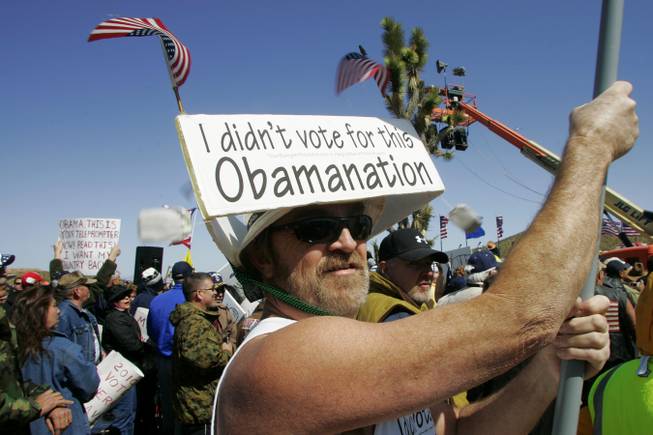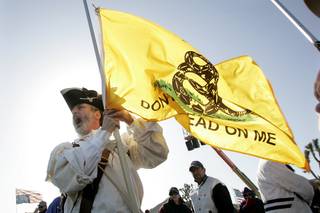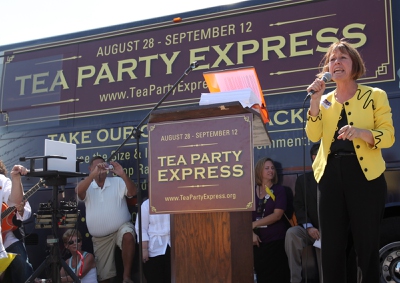
A man who gave his name as Hustusa attends the the “Showdown in Searchlight” Tea Party Express rally just outside Searchlight on Saturday, March 27, 2010.
Sunday, Nov. 21, 2010 | 2:01 a.m.
Tea Party: "Showdown in Searchlight"
The Tea Party Express buses kicked off their latest national road trip Saturday with a rally in Sen. Harry Reid's hometown of Searchlight, Nev., which only has a population of 700. Sarah Palin gave the keynote address to the thousands who showed up for the "Showdown in Searchlight."
Sun archives
- Sharron Angle gets Tea Party endorsement in Senate race (4-15-2010)
- Carson City rally draws hundreds to protest taxes, health reform (4-15-2010)
- Many Tea Party attendees felt compelled to rally (3-28-2010)
- Tea Party draws faithful, but important work awaits (3-28-2010)
- Excerpt from Sarah Palin’s address (3-28-2010)
- Sarah Palin rallies thousands in Harry Reid’s hometown (3-27-2010)
- Ann Coulter rails against government intervention in health care (3-27-2010)
Nevada’s always had a somewhat schizophrenic electorate.
One year, voters resoundingly support a ballot measure to codify abortion rights for women. A few years later, they just as resoundingly ratify the largely Christian view of marriage as being between a man and a woman.
Through it all, according to conventional wisdom, a spine of libertarianism holds together an electorate whose philosophy seems to vacillate.
But that conventional wisdom may no longer hold true. Nevada’s brand of conservatism and largely “stay out of my pocketbook and my bedroom” mentality are shifting — some would argue have shifted — to a more socially conservative vein.
That shift could be seen in the boisterous Tea Party movement that emerged on the political stage in Nevada.
First a caveat: It’s difficult to make broad generalizations about the Tea Party movement because it isn’t a monolithic body with a sharply delineated philosophy. A variety of voters with a variety of beliefs identify with the movement.
But many initially believed the Tea Party, especially in Nevada, was an embodiment of that sharply libertarian, leave-my-pocketbook-alone strain typical of politics in the Silver State.
Indeed, that was the point of the rallies and the posters and the rhetoric.
The Tea Party honed its message to the biggest issue of the day: the economy. Federal spending and regulation topped the bill.
That doesn’t mean, however, that those who identify with the Tea Party don’t hold deeply conservative beliefs on social issues.
In fact, a new analysis by fellows at the Brookings Institution, a left-leaning think tank, found the Tea Party movement reaffirmed earlier polling data that holds Tea Party activists have more in common with the Christian conservative movement than with libertarianism.
“Yes, there are many ‘Teavangelicals,’ ” writes the study’s authors E.J. Dionne and William Galston. “Nearly two-thirds of Tea Party movement members say that abortion should be illegal in all or most cases. And 45 percent of the Tea Party members say there should be no legal recognition for same-sex couples, compared with only 33 percent of the public as a whole.”
Indeed, the Tea Party movement’s own candidate in Nevada, Sharron Angle, embodied a set of beliefs more deeply conservative on social issues than most Republicans elected to major office in Nevada.
And her base wasn’t as repelled as her opponent Senate Majority Leader Harry Reid wanted them to be by her “extreme” views on abortion, religion and other social issues.
“If Angle represented the Tea Party movement, she seems like she would be more comfortable in a Southern state, not a libertarian one,” said Robert Lang, a senior fellow at Brookings Institution in Las Vegas. “If she was the choice of the Tea Party, I’d say that’s manifest evidence that it’s not Barry Goldwater conservatism at play.”
Yes, Angle lost. And she lost in large part because Reid was able to amplify — and contextualize to his benefit — Angle’s socially conservative views to the broader electorate. That could be a signal that Nevada voters eschew that brand of conservatism.
But Reid’s approach didn’t argue that Angle was too socially conservative for the Nevada electorate. Rather, Reid used Angle’s specific positions and her specific words against her, not her broader philosophy.
Lang argues the shift from libertarianism is occurring within the conservative movement across the country. But he said demographic shifts occurring with the influx of retirees from Orange County and other conservative areas in the country have helped bring about Nevada’s change.
State historian Guy Rocha argues that Nevada’s shift toward social conservatism is evident in the fact public policy leaders no longer look to monetizing vices as a way out of the state’s budget woes. In the past, gambling, prostitution and quickie divorces have helped Nevada out of recessions and budget problems.
No longer are lawmakers willing to expand the tax base to morally questionable if not illegal (at least in Nevada) activities such as prostitution.
“Nevada’s libertarian streak had been diluted with social conservative newcomers, and the kinds of options Nevada considered in terms of legislating industries based on ignoring social convention won’t be considered,” Rocha said. “We won’t do that to deal with our shortfall.”



Join the Discussion:
Check this out for a full explanation of our conversion to the LiveFyre commenting system and instructions on how to sign up for an account.
Full comments policy